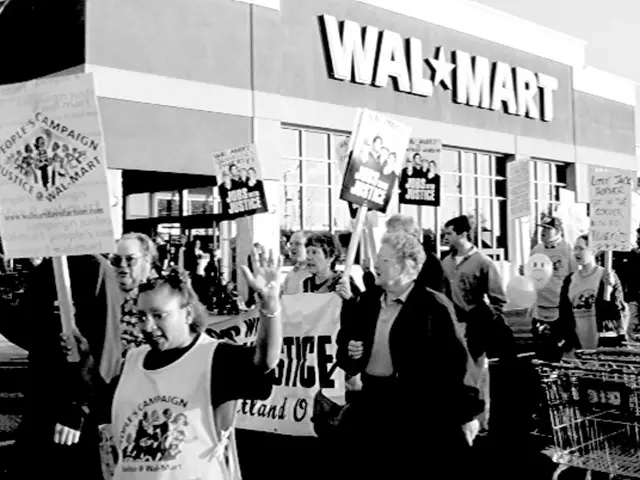Inundated with feelings of anxiety and status comparisons
Fast-forward through your Instagram feed and you'll see a flurry of excess - martini glasses clinking, sun-drenched cabanas, and indulgent dinners at fancy restaurants. The question rolls off your tongue, "What the hell's happening with the economy? Is it Luxardo cherry season for everyone?"
Scrolling through the news, you find a wild rollercoaster of tariffs and economic turbulence. Finance gurus are talking about retirement savings and the stock market like it's a ticking time bomb.
Confronted by these images of even your broke-ass roommate's co-worker's vacations, work bags, and TikTok-trendy sweaters, you can't help but feel like maybe you're not cutting it.
"I want that blinged-out iPhone, those on-trend T-shirts, and yes, those oversized fur coats everyone's flaunting. Gimme that Gordon Gekko-wannabe power suit!" says Devin Walsh, a 20-something marketing whiz living in New York City.
Meanwhile, the press is using terms like "Great Depression" to describe these economic times. It's a cocktail of confusion, anxiety, and FOMO that comes with coping with a tough economy while battling the constant barrage of every friend's luxury vacation on social media.
"One click, and I'm overwhelmed by people's trips, meals out, and taste for the high life. My financial doubts escalate, thinking I can't keep up with the smug co-workers and Insta-famous influencers," says Veronica Holloway, a data analyst in Chicago.
Feeling the pinch of economic self-doubt, many young people are suffering from what the financial experts call "money dysmorphia." It's a twisted off-shoot of body dysmorphia, where people have a distorted view of their financial well-being due to the warped reality on social media.
"You're in a worrisome situation, questioning if you have enough money, but the numbers say you're good. Scrolling through your Instagram, you see everyone jet-setting around the world, and you wonder, 'What am I doing wrong?'" explains Aja Evans, a financial therapist working with clients struggling with dysmorphia.
Distorted perceptions of reality can lead to reckless spending or a disciplined frugalness. The under-30 crowd is racking up a mountain of credit card debt in the thousands, and a 2024 study showed that nearly one-third of Americans, including more than half of Gen Z, felt the effects of this financial distortion.
When times get tough, the spending habits change. This economic uncertainty is layered on top of a generation that has grown up with easy access to products and services thanks to venture capital. Meanwhile, social media platforms paint an even glossier picture of affluence, from the flashiest dinner reservations to tropical jet-setting adventures.
This dizzying mix of economic instability and a luxurious Instagram aesthetic has led to the rise of what trend forecasters call the "boom boom aesthetic." It's a celebration of lavish old-money consumption, with fashion labels, influencers, and everyday spenders embracing flashy, decadent styles.
It's a mind-bender to keep up with the spending standards set by the Joneses on social media. Many young people are left feeling anxious or guilt-ridden after making impulsive purchases, while others scale back their spending to keep up appearances. The result is a wide chasm between the fear of overspending and the pressure to compete with the Joneses.
Dessie DiMino, a tech worker, grapples with the paradox. "Instagram's highlight reel of vacations and expensive meals makes me worry about my finances. I crave spending on indulgent experiences but brood over the news about economic uncertainty," she says.
This generational shift in spending habits is a modern twist on the infamous Lipstick Effect, where people spend more on small treats during economic downturns as a way to lift their spirits. Today's 20-somethings are grappling with conflicting pressures to splurge, save, and ski in the face of economic woes and social media-fueled envy.
"It's a vicious cycle of anxiety and comparison. I feel like I'm on a wild rollercoaster of indecision, questioning whether to bite the bullet and stay home or immerse myself in luxury spending," says Ella Johnson, another young professional dealing with the uncertainty.
Most Read Stories
- Why Alaska Air Wants Portland to Be Its Sea-Tac 'Relief Valve'
- Deputies Defy Franklin County Sheriff's Order to Take Guns from Jail
- I-5 in Tacoma Reopens after Fatal Semitruck Crash
- Teen, Couple Who Ran Tech Company Die in Shooting at Newcastle Home
- Pike Place Market's Virginia Inn Resolves Lease Issue, Will Remain Open
Jobs are scarce as economic turbulence dominates the news, with finance experts discussing retirement savings and the stock market as if they are ticking time bombs. The constant stream of luxury vacations, meals, and lavish lifestyles on social media creates feelings of FOMO and inadequacy, leading many young people to question their own financial well-being.
This distorted perception of reality, called "money dysmorphia," is causing reckless spending or disciplined frugality among the under-30 crowd, with a 2024 study showing that nearly one-third of Americans, including more than half of Gen Z, feel the effects of this financial distortion.
In an attempt to lift their spirits during tough economic times, young people are either splurging on indulgent experiences or scaling back their spending to keep up appearances. This conflict between the fear of overspending and the pressure to compete with the Joneses on social media creates a wide chasm of anxiety and guilt-ridden feelings after impulsive purchases.
As a result, the spending habits of the under-30 crowd are changing, with a rise in credit card debt in the thousands. Trend forecasters call this new spending aesthetic the "boom boom aesthetic," which celebrates lavish old-money consumption through fashion labels, influencers, and everyday spenders embracing flashy, decadent styles.
However, the reality is that many young professionals are grappling with the paradox of wanting to indulge in luxury spending while also worrying about their finances in the face of economic uncertainty. Dessie DiMino, a tech worker, admits to feeling this conflict, as she both craves spending on indulgent experiences and broods over the news about economic instability.
This generational shift in spending habits is a modern twist on the infamous Lipstick Effect, where people spend more on small treats during economic downturns as a way to lift their spirits. Today's 20-somethings are grappling with conflicting pressures to splurge, save, and ski in the face of economic woes and social media-fueled envy.
In Seattle, Alaska Air has proposed Portland as a "relief valve" due to economic woes, while crime and justice issues continue to make headlines, such as a shooting at a Newcastle home that claimed the lives of a teen and a couple who ran a tech company. meanwhile, the economy, finance, and personal finance sectors are a hot topic, with general news outlets constantly reporting on the impacts of COVID-19 and the Great Depression-like times.
As the climate of fear and uncertainty continues to loom, it's important for young people to focus on their mental health, fitness and exercise, and workplace wellness to maintain a sense of stability and balance during these challenging times. Education and self-development, personal growth, technology, and even politics all play a role in helping young professionals navigate this complex terrain.
In these trying times, finding support systems and staying connected with loved ones can help alleviate feelings of isolation and fear. By embracing a holistic approach to well-being, focusing on nutrition, personal finance, and self-care, young people can create a sense of peace and purpose in the midst of economic uncertainty.
Furthermore, it's crucial to recognize the importance of health and wellness, both physical and mental, in the workplace. Mental health issues have skyrocketed since the onset of the pandemic, and it's essential for employers to prioritize their employees' well-being by offering resources and support to help them cope with the anxieties and stresses of the modern world.
Ultimately, it's up to each individual to take control of their lives and make conscious choices that align with their values and aspirations. By prioritizing personal growth, staying informed, and maintaining a healthy perspective on social media, young people can overcome the challenges of economic uncertainty and emerge stronger, wiser, and more resilient than ever before.









